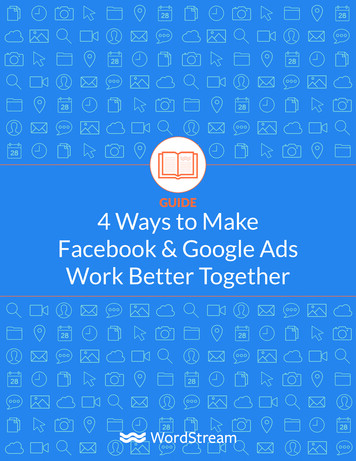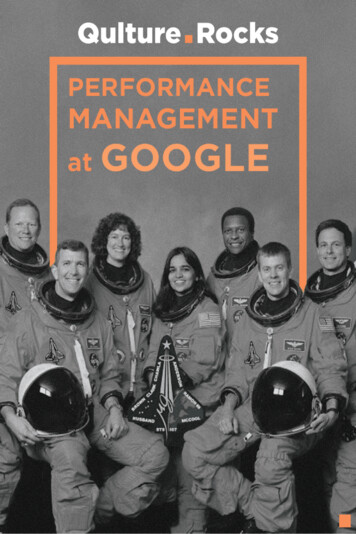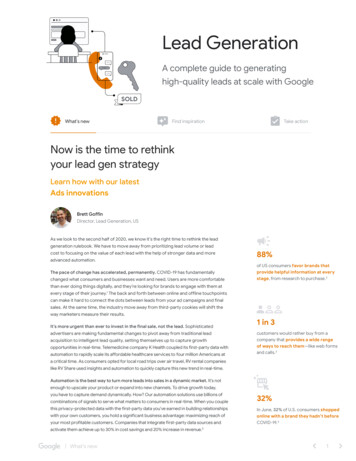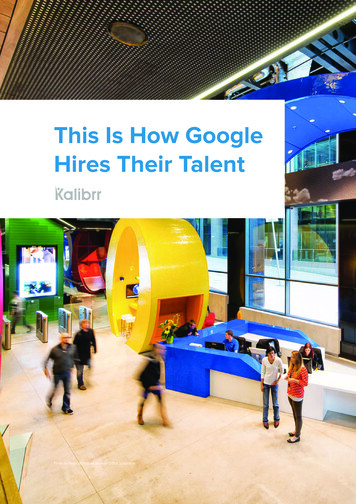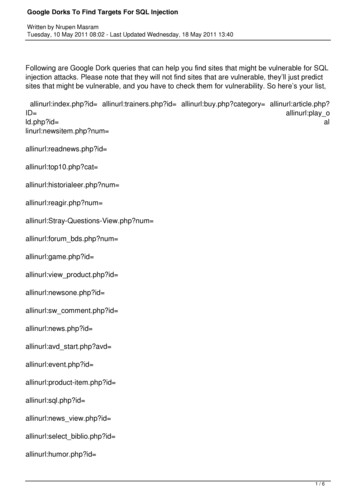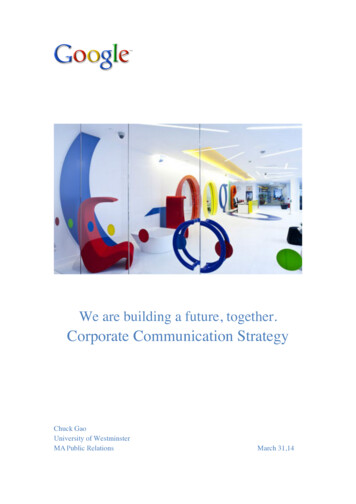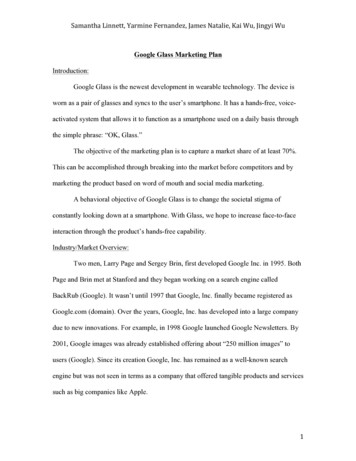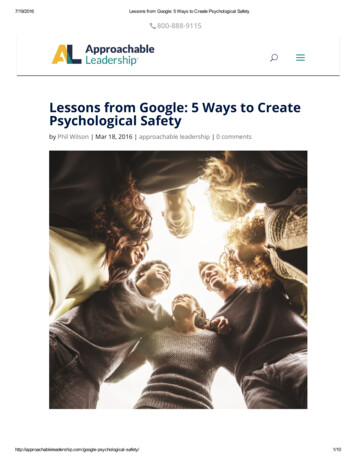
Transcription
7/19/2016Lessons from Google: 5 Ways to Create Psychological Safety 800-888-9115UaLessons from Google: 5 Ways to CreatePsychological Safetyby Phil Wilson Mar 18, 2016 approachable leadership 0 commentshttp://approachableleadership.com/google psychological safety/1/10
7/19/2016Lessons from Google: 5 Ways to Create Psychological Safety LinkedIn 31 Twitter Facebook 10 Companies do better when workers collaborate.Employees who work in teams produce better results and report higher job satisfaction.It’s been proven over and over again. Most recently by Google.In 2012, Google decided to ask itself a really important question: why do some Googleteams shine while others stumble? When you happen to be Google you have access tosome of the smartest statisticians, organizational psychologists, sociologists and engineersaround. They deployed this incredible talent on a quest to 럝 nd out what makes their bestteams click. They dubbed the assignment Project Aristotle.Project Aristotle researchers looked at teams in every possible way to 럝 gure out what setapart the teams that excelled at Google versus the teams that didn’t. Some of thecorrelations they looked at included:Were the teams made up of people with similar interests?Were they motivated by the same kind of rewards?Did teammates socialize outside the o 噿ce? How often?How did their education backgrounds compare to each other?Were teammates outgoing or shy?What was the gender ratio of each team?Do Personality Types, Skills, or Background Predict Team Success?NoOver the course of a year, the researchers looked at 180 teams from all over the companyand found no patterns showing that, “a mix of speci럝 c personality types or skills orbackgrounds made any diꧨ荺erence.” Each time they thought they had narrowed down a setof group norms (“traditions, behavioral standards and unwritten rules that govern how wefunction when we gather”), they would discover another, equally successful team with thecomplete opposite set of characteristics.As time went on however, the researchers recognized two behaviors that all good teamsshared.First, all members spoke approximately the same amount of time, a practice known asconversational turn-taking. “As long as everyone got a chance to talk, the team did well Butif only one person or a small group spoke all the time, the collective intelligence le psychological safety/2/10
7/19/2016Lessons from Google: 5 Ways to Create Psychological SafetySecond, good teams all had high average social sensitivity, meaning “they were skilled atintuiting how others felt based on their tone of voice, their expressions and othernonverbal cues.Coincidentally (or not) conversational turn-taking and average social sensitivity are traits ofwhat’s known as something psychologists refer to as psychological safety. Harvard BusinessSchool professor Amy Edmondson de럝 nes psychological safety as:“a shared belief held by members of a team that the team is safe for interpersonalrisk-taking [It instills] a sense of con럝 dence that the team will not embarrass, reject orpunish someone for speaking up It describes a team climate characterized byinterpersonal trust and mutual respect in which people are comfortable beingthemselves.”What Project Aristotle researchers found was that while there were many behaviors thatseemed important to establish as team norms, psychological safety was the most critical.That begged the question How do you establish psychological safety?Sure, you can tell people to do things like listen more, take turns talking, try to pay moreattention to people’s feelings and notice when they’re upset, but does that really everwork? Most of the time it just goes in one ear and out the other. After all, who wants to bereminded of proper social decorum?These changes tend to develop organically. But someone’s got to plant the seed. And thatresponsibility falls on the leader. That’s what Project Aristotle found. And I agree.Leading begins with connection. Andconnection feeds collaboration.CLICK TO TWEETThere was one manager at Google who, when confronted with the Project Aristotleresearch, realized that his team didn’t clearly understand their role in the overall goal ofthe company nor did they think the work they did had much of an impact.This bothered the manager so much that he gathered the group oꧨ荺-site to try to get to thebottom of where these feelings came from. Then, once he had them all there, all of asudden he felt moved to share with them that he’d been battling cancer. He, for the 럝 rsttime, allowed himself to be vulnerable to his team.http://approachableleadership.com/google psychological safety/3/10
7/19/2016Lessons from Google: 5 Ways to Create Psychological SafetyThe next thing he knew, someone else shared something they’d been dealing with in theirpersonal life. Then someone else shared. It continued on and on this way. It’s like thesepeople, who saw and spoke with each other every day, 럝 nally felt comfortable beingvulnerable with each other for the 럝 rst time. One member said:“I think, until the oꧨ荺-site, I had separated things in my head into work life and life life But the thing is, my work is my life. I spend the majority of my time working. Most ofmy friends I know through work. If I can’t be open and honest at work, then I’m notreally living, am I?”There is an undeniable link between the way people feel about work and the quality ofwork they produce. Leading begins with connection. And connection feeds collaboration.What makes that manager at Google such a great manager is because he took the 럝 rststeps toward creating a psychologically safe environment – one where people feelcomfortable speaking up when they have ideas, where collaboration is constant.Here are 5 ways approachable leaders create psychologicalsafety:1. They are available and welcoming. Make a point to walk by and say hello every onceand a while. Be sure to smile (with your eyes). And when someone approaches you with anissue or question, don’t make them feel like an interruption.2. They get second opinions. We don’t have to do everything alone. Leaders need advicetoo. Ask for it. Show your employees you value their opinion.3. They encourage collaboration. If you see two employees chatting (about work life orlife life) don’t shoo them away from each other. Be grateful they’re connecting. They willboth be more creative and productive.4. They engage in personal conversations. If you have to get out of the o 噿ce to do it,then get out of the o 噿ce. Consider a monthly rotation schedule where you takeemployees to lunch. It’s amazing the barriers you can break down simply by gettingoutside of ground zero (just think about the Google manager).5. They spread the love. Don’t play favorites. If you notice someone who isn’t contributingask them what they’re thinking. Try to make sure everyone is included. Be kind toeveryone.What kind of environment do you create as a leader? Do you encouragecollaboration or do you make your employees feel like they can’t be seen talking toeach other? When was the last time you had a “real” conversation with a coworker?http://approachableleadership.com/google psychological safety/4/10
7/19/2016Lessons from Google: 5 Ways to Create Psychological SafetyWhat do you think about these ideas? We want to know! LinkedIn 31 Twitter Facebook 10 LIKE THIS POST?Sign up for our blog updates and nevermiss a post. We’ll send you a FREE eBookas a thank-you.First NameEmailGet It Now!EmailJoin Over 8,880 Followers, Fans and SubscribersWe're Social --- Follow Us! http://approachableleadership.com/google psychological safety/5/10
7/19/2016Lessons from Google: 5 Ways to Create Psychological SafetyLatest ActivityTweets by @ApproachableldrPhillip Wilson@Approachableldr[ICYMI] Why You Should Celebrate More with Your m/google psychological safety/6/10
7/19/2016Lessons from Google: 5 Ways to Create Psychological Safety15 JulPhillip Wilson@Approachableldr[ICYMI] Why You Should Celebrate More with Your Teambit.ly/29ViQnL15 JulPhillip Wilson@Approachableldr[New Post] Why You Should Celebrate More with Your Teambit.ly/29DjCTS15 JulPhillip p.com/google psychological safety/7/10
7/19/2016Lessons from Google: 5 Ways to Create Psychological Safety13 JulPhillip Wilson@ApproachableldrIdentifying Team Engagement – Ask #HR Bartenderbit.ly/29xUf6jWatch the Approachable Leadership Keynote14:55Recent PostsWhy You Should Celebrate More with Your Teamhttp://approachableleadership.com/google psychological safety/8/10
7/19/2016Lessons from Google: 5 Ways to Create Psychological SafetyBrexit Hits Home Approachability MinuteThe Science Behind Building Trust at WorkLeadership Lesson Out of the Orlando ShootingApproachability Quiz Featured on AL.comWhat others say about Approachable LeadershipHere is what others have to say about recent Approachable Leadership Keynotes andWorkshops.Great Interactive Session, New Techniques"I recently attended the Approachable Leadership Session with Phil Wilson at the CUEConference in Denver. It was a great session. I loved the interactive sessions, they reallyhelp you learn some new techniques. Phil does a great job involving the participants andkeeping everything moving at a great pace. I am so enthralled with this training thatI brought Phil to our location to put my troops thru the paces for approachableleadership!"Laurie Galmeyer, Director of Human Resources, ETFNMasterful Approach Captured Audience“Phil is masterful in his approach and paints a compelling vision. He has the ability tocapture an audience’s attention and take them on a journey through images andhttp://approachableleadership.com/google psychological safety/9/10
7/19/2016Lessons from Google: 5 Ways to Create Psychological Safetyanecdotes. Whether you have 1 or 100 supervisors in your organization, I wouldrecommend Phil Wilson’s “Approachable Leadership” session. And learning how to livelonger and make more money wasn’t so bad either.”W. Alex Koch, Manager of Positive Associate Relations, TJXDemysti럝 es Leadership, Use Lessons Every Day“Your workshop demysti›ed what connecting with another human being – whether anemployee, client, or spouse – can be like. I’ve used his 3-question strategy every day,both in my personal and professional relationships, to become a better coach, sister, andfriend.”Lori Broyles, Business and Entrepreneurial Services Coordinator, Francis TuttleTechnology CenterAbout UsResearchSpeakingLeadership QuotesPrivacy ConditionsGet In Touch! 2016 Approachable Leadershiphttp://approachableleadership.com/google psychological safety/10/10
There was one manager at Google who, when confronted with the Project Aristotle research, realized that his team didn’t clearly understand their role in the overall goal of the company nor did they think the work they did had much of an impact. This bothered the manager so much that he gathered the group oꧨ荺-site to try to get to the bottom of where these feelings came from. Then, once .File Size: 1MBPage Count: 10

